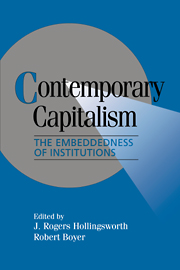Book contents
- Frontmatter
- Contents
- Acknowledgments
- List of Contributors
- Chapter 1 Coordination of Economic Actors and Social Systems of Production
- PART I THE VARIETY OF INSTITUTIONAL ARRANGEMENTS AND THEIR COMPLEMENTARITY IN MODERN ECONOMIES
- PART II HOW AND WHY DO SOCIAL SYSTEMS OF PRODUCTION CHANGE?
- Chapter 6 Beneficial Constraints: On the Economic Limits of Rational Voluntarism
- Chapter 7 Flexible Specialization: Theory and Evidence in the Analysis of Industrial Change
- Chapter 8 Globalization, Variety, and Mass Production: The Metamorphosis of Mass Production in the New Competitive Age
- Chapter 9 Continuities and Changes in Social Systems of Production: The Cases of Japan, Germany, and the United States
- PART III LEVELS OF SPATIAL COORDINATION AND THE EMBEDDEDNESS OF INSTITUTIONS
- PART IV CONCLUSION
- Index
Chapter 8 - Globalization, Variety, and Mass Production: The Metamorphosis of Mass Production in the New Competitive Age
Published online by Cambridge University Press: 05 June 2012
- Frontmatter
- Contents
- Acknowledgments
- List of Contributors
- Chapter 1 Coordination of Economic Actors and Social Systems of Production
- PART I THE VARIETY OF INSTITUTIONAL ARRANGEMENTS AND THEIR COMPLEMENTARITY IN MODERN ECONOMIES
- PART II HOW AND WHY DO SOCIAL SYSTEMS OF PRODUCTION CHANGE?
- Chapter 6 Beneficial Constraints: On the Economic Limits of Rational Voluntarism
- Chapter 7 Flexible Specialization: Theory and Evidence in the Analysis of Industrial Change
- Chapter 8 Globalization, Variety, and Mass Production: The Metamorphosis of Mass Production in the New Competitive Age
- Chapter 9 Continuities and Changes in Social Systems of Production: The Cases of Japan, Germany, and the United States
- PART III LEVELS OF SPATIAL COORDINATION AND THE EMBEDDEDNESS OF INSTITUTIONS
- PART IV CONCLUSION
- Index
Summary
INTRODUCTION
In the last fifteen years, there have been many theoretical efforts to explain the breaking down of the old Fordist model of accumulation. Thus, it is not our intent to review the many causes which explain the erosion of this model. In this paper, we choose to focus on new social institutions that are emerging from the breakdown of the Fordist model, and to focus on the “transition” towards new institutional configurations of “post-Fordism.” We are concerned with new patterns and industrial routines at the level of both intra- and interfirm relationships. By doing this, we hope to contribute to the understanding of the embeddedness of institutions in modern capitalism.
In our judgment, there are two determinants of crucial importance to understand the transitory period in which we are living. These two determinants, largely interdependent and interrelated, are, on the one hand, the process of “globalization” and, on the other, an ongoing technological and organizational revolution. These two determinants are crucial, for they contribute to eroding and destroying the classical forms of production and principles of efficiency of the old Fordist model, and as they push societies toward the adaptation of new institutional configurations. In this sense, these two determinants contribute to the new “post-Fordist” regime(s) of accumulation.
To explore these aspects of the transitory regime towards post-Fordism, we concentrate on several interrelated issues.
- Type
- Chapter
- Information
- Contemporary CapitalismThe Embeddedness of Institutions, pp. 240 - 264Publisher: Cambridge University PressPrint publication year: 1997
- 7
- Cited by



